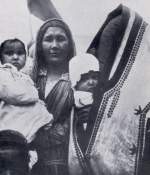 |
Ella Christie, a plucky Scottish anthropologist, shrugged off the constraints
of starched collars and cucumber sandwiches and in 1912 set of for Central
Asia breaking into the male dominated world of adventure travel writing.
Having braved a trip down the Oxus River in the last available space on
deck, she arrived dusty and dishevelled to Khiva.
She was welcomed by the Tsar's Colonel Korniloff and his friendly wife
who invited her to stay. This was much to the relief of the Khan who had
felt obliged to offer her hospitality but had had no experience in catering
for unaccompanied female guests, Ella being the first unaccompanied European
traveller to visit Khiva. She was only able to meet the khan briefly and
was not impressed, describing him as a weak looking specimen. "His
name is Isfandir Bagdour (mighty) Khan, a fine name for such a measly
looking man."
Whilst Isfandir Khan seemed little interested in Christie, Islam Hoja,
the Vizier, was quick to offer an invitation.
"Colonel Korniloff and I set off one morning in the Victoria, his best carriage, built in Kazan. His palace is not far from the Khans summer one… Islam Hoja, a tall, fine looking man in silk robes, rose with great dignity, shook hands and placed me beside him on the garden seat, while tea in tumblers, with sweetmeats and fancy biscuits, were at once offered. I conversed by means of Fritz, who interpreted that the Khan wished to present me with a portrait of himself, and then Islam Hoja gave me one of himself. These I asked him to sign, which he did… He also gave me an ancient Khivan gold coin and asked if I would like to see his rooms, as he evidently was very proud of their European furnishings. In the first saloon was a piano, which of course, no one could play."
 |
Christie was mortified when, a few months later, she received a letter
from Natalie Korniloff, the Colonel's wife, recounting how Islam Hoja
had been brutally assassinated (see: Islam Hoja Complex).
Khiva itself was full of surprises, including the German Mennonite community
at Okh Meched. She was kindly welcomed and they even tried to recruit
her their school teacher, (see: Mennonite Germans). She
was also given freedom to wander around the city at her leisure. However,
some parts of the city were off limits even to female tourists. Despite
repeated pleas the nearest she was allowed to the Palace Harem was a glimpse
of the ladies pleasure grounds.
"In the centre was a large stone basin of water on which floated tiny caiouques, or native boats, with baby oars; swings suspended from wooden bars with which to amuse themselves; benches and summer houses in which to rest, with flower beds of geraniums, petunias and roses to brighten the scene. But how inadequate to brighten the dull lives that are spent there, as the women are never allowed out except in a Khivan cart whose arched top is completely covered over with rugs."
Christie bid a sad farewell to Khiva and to Colonel Korniloff, little
expecting that the kindly couple would be murdered by Bolsheviks just
a few years later.
However, this was not to be her last encounter with Khivans. Whilst in
Moscow a few months later Christie was accosted by the Khan's Minister
of Finance who was delighted to see her. She barely recognised him in
his shabby Russian dress, but was rescued by her translator who remembered
him.
"Away from his mutton Pillaus, he looked half starved and home sick, and with joy mentioned that he was returning the following week. Truly, fine feathers make fine birds, his rich Khalats and caracul cap having been discarded in favour of what he doubtless thought was a fashionable attire, but with them he lost the semblance of his dignity that had been such a pronounced feature in his progress through Khiva."
Ella Christies book: Through Khiva to Golden Samarkand was finally published in 1925, having been stalled by the advent of the First World War.
| Historical
Travellers Overview | The Wandering Moor | The Luckless Wool Merchant The Diplomatic Spy | The Hungarian Dervish | The Lone Female The Eccentric Cyclist | The True Blue Captain |